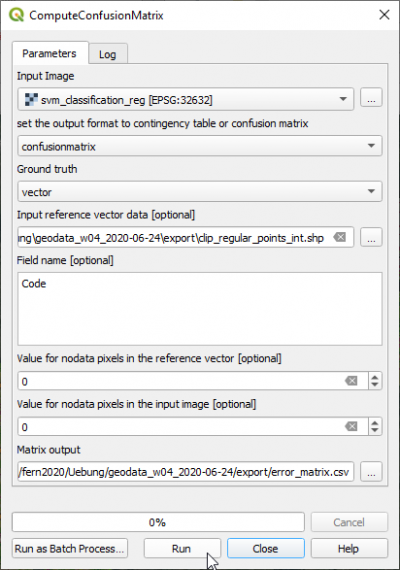Map validation
From AWF-Wiki
(Difference between revisions)
(→Create validation sample points with a stratified random sampling design) |
(→Area estimation) |
||
| Line 26: | Line 26: | ||
==Area estimation== | ==Area estimation== | ||
| − | Start Rstudio and type | + | Start Rstudio and type: |
<pre> | <pre> | ||
library(shiny) | library(shiny) | ||
Revision as of 14:47, 6 January 2020
Contents |
QGIS Processing toolbox with OTB plugin
- Type into the search box of Processing tools Confusion and double click ComputeConfusionMatrix.
- Set the classified map as Input image.
- Select the output file name with the extension .csv under Matrix output.
- The validation data can be in vector or raster format. Select as Ground truth vector.
- Set the validation file CE_2020-01-03.shp as Input reference vector data.
- Set the Field name with the class code valid_clas.
- Click Run.
- Open the CSV output file with Libre Office Calc or MS Excel. Calculate User accuracies, Producer accuracies, Overall accuracy and Kappa index.
Accuracy assessment and stratified area estimation with R
FAO implemented a map validation and stratified area estimation tool based on R, Rstudio and the Shiny package. The method is based on Olofsson et al. 2013, 2014) If not already installed on your laptop: install R, RStudio and Rtools. Start Rstudio and type into the console:
install.packages("shiny", dependencies = TRUE)
Create validation sample points with a stratified random sampling design
Start Rstudio and type:
library(shiny)
options(shiny.launch.browser = TRUE)
runGitHub("openforis/accuracy-assessment",subdir="aa_design")
Area estimation
Start Rstudio and type:
library(shiny)
options(shiny.launch.browser = TRUE)
runGitHub("openforis/accuracy-assessment",subdir="aa_analysis")
